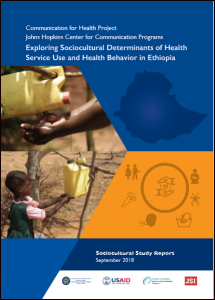Exploring Sociocultural Determinants of Health Service Use and Health Behavior in Ethiopia
This is an explorative qualitative study using the socio-ecological model to identify barriers and facilitators for health services use and health behaviors. The overall goal of this study was to identify sociocultural determinants that influence health service use and behavior in the six health areas in order to inform project health interventions: Family Planning and Reproductive Health, Maternal and Child Health, HIV PMTCT, and handwashing/hygiene.
Increasingly, SBCC policymakers and practitioners need to look beyond the individual as the unit of analysis, as household, community, society, and health systems play a major role in improving health outcomes. Because it enables analysis at multiple levels, the socio-ecological model (SEM) is an appropriate model for understanding the processes of complex interventions.
Source: Communication for Health Ethiopia
Date of Publication: February 11, 2020
SIMILIAR RESOURCES
Tools
Examples
- Advocating for Social Marketing Programs to Local Stakeholders
- Moving the Needle on Health Behaviors
- Using Data to Design an Evidence-based Social and Behavior Change Program in Rural Nepal
- The Behavior Change Framework
- Barrier Analysis Questionnaires
- COVID-19 Hygiene Hub
- La Planification Familiale dans les Situations d'Urgence: Essentielle,, Voulue, Necessaire et Realisable
- What Really Influences our Behaviours?
- MULTI-SBC: The Programmatic Aid for Multi-Sectoral Integration of SBC for FP Practitioners
- The Infection Control Symbol Package

